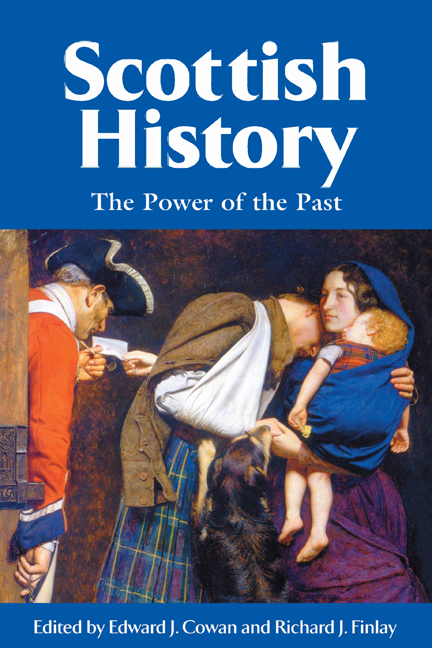Book contents
- Frontmatter
- Contents
- Contributors
- Introduction
- 1 The Picts‘ Place in the Kingship's Past Before John of Fordun
- 2 The Demonisation of King John
- 3 Late Medieval Scotland and the Matter of Britain
- 4 In Search of the Scottish Reformation
- 5 Civil Society and the Celts: Hector Boece, George Buchanan and the Ancient Scottish Past
- 6 The Covenanting Tradition in Scottish History
- 7 ‘What's in a Name?’: Pedigree and Propaganda in Seventeenth-Century Scotland
- 8 The Ideological Uses of the Picts, 1707-c.1990
- 9 The Jacobite Cult
- 10 Queen Victoria and the Cult of Scottish Monarchy
- 11 ‘Their Laurels Wither'd, and their Name Forgot’: Women and the Scottish Radical Tradition
- 12 Tomorrow's Ancestors: Nationalism, Identity and History
- Index
3 - Late Medieval Scotland and the Matter of Britain
Published online by Cambridge University Press: 24 September 2020
- Frontmatter
- Contents
- Contributors
- Introduction
- 1 The Picts‘ Place in the Kingship's Past Before John of Fordun
- 2 The Demonisation of King John
- 3 Late Medieval Scotland and the Matter of Britain
- 4 In Search of the Scottish Reformation
- 5 Civil Society and the Celts: Hector Boece, George Buchanan and the Ancient Scottish Past
- 6 The Covenanting Tradition in Scottish History
- 7 ‘What's in a Name?’: Pedigree and Propaganda in Seventeenth-Century Scotland
- 8 The Ideological Uses of the Picts, 1707-c.1990
- 9 The Jacobite Cult
- 10 Queen Victoria and the Cult of Scottish Monarchy
- 11 ‘Their Laurels Wither'd, and their Name Forgot’: Women and the Scottish Radical Tradition
- 12 Tomorrow's Ancestors: Nationalism, Identity and History
- Index
Summary
Late medieval Scotland saw the production of a series of chronicles that sought to trace the story of the Scottish kingdom and people from their earliest origins. John of Fordun's Chronica Gentis Scottorum (1371-87), Andrew of Wyntoun's Original Chronicle (1408-1424) and Walter Bower's Scotichronicon (1441-7) all attempted to provide a coherent and unified historical narrative that explained and illustrated the emergence and development of the Scots as a distinct people under its own sovereign rulers from biblical times onwards. At the heart of these accounts was the story of Scottish kingship and the royal dynasty that stood for and symbolised the Gens Scottorum. The chronicles established ancient precedents for the political status and territorial integrity of the late fourteenth- and fifteenth-century kingdom as a fully independent monarchy, and gloried in the way in which that standing had been won and maintained against a series of internal and external enemies and threats.
Historians have tended to see the production of these late medieval chronicles as part of a ‘war of historiography’ and propaganda that ran alongside and contributed to the less cerebral conflicts of the Wars of Independence. Fordun's work, in particular, has been characterised as a direct response to the English crown's deployment of the mythical history of the ancient British kingdom to justify its claims to superiority over the entire island of Britain. The appearance of Fordun's Chronica Gentis Scottorum is also held to have introduced a view of the kingdom's past that was swiftly established as the orthodox and dominant tradition in Scotland. Fordun's Latin chronicle was certainly incorporated, and to an extent modified and expanded, by Walter Bower, abbot of Inchcolm in the production of his mammoth work, the Scotichronicon (also in Latin), in the 1440s. Thereafter, most chronicles of the second half of the fifteenth century and the early sixteenth century relied heavily on the narrative framework provided by Fordun/Bower as the basis for their discussion of the history of the Scottish kingdom. By the midfifteenth century Fordun's vision of the origins of the Scottish royal line in the eponymous Egyptian princess Scota, and the subsequent history of the dynasty and race descended from her, was to be found also in short vernacular histories.
- Type
- Chapter
- Information
- Scottish HistoryThe Power of the Past, pp. 47 - 72Publisher: Edinburgh University PressPrint publication year: 2020



